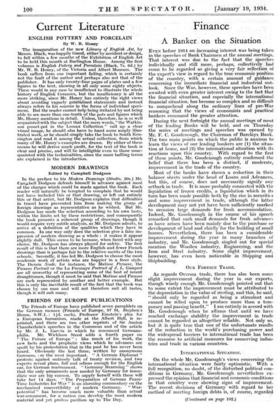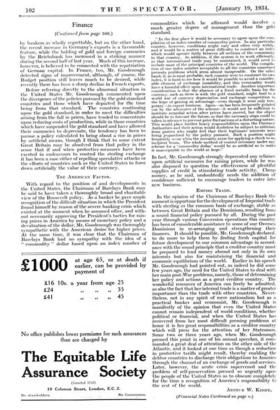Finance
A Banker. on the Situation
EVEN before 1914 an increasing interest was being taken in the speeches of Bank Chairmen at the annual meetings. That interest was due to the fact that the speeches individually and still more, perhaps, collectively had come to be regarded as giving a very fair reflection of the expert's view in regard to the true economic position of the country, with a certain amount of guidance concerning the immediate financial and industrial out- look. Since the War, however, these speeches have been awaited with even greater interest owing to the fact that the financial situation, and especially the international financial situation, has become so complex and so difficult to - comprehend along the ordinary lines of pm-War reasoning that the views of economists and practical bankers command the greater attention.
During the next fortnight the annual meetings of most of the leading Banks will be held, and on Thursday the series of meetings and speeches was opened by Mr. F. C. Goodenough, the Chairman of Barclays Bank. The two main points on which the public is anxious to learn the views of our leading bankers are (1) the situa- tion at home, and (2) the international situation with its reactions upon this country. With regard to the first of these points, Mr. Goodenough entirely confirmed the belief that there has been a distinct, if moderate, improvement in the trade of the country. - Most of the banks have shown a reduction in their balance sheets under the head of Loans and Advances, but this, of course, does not necessarily signify any setback in trade. It is more probably connected with the liquidation of frozen credits, a liquidation which in its turn has been made possible both by the rise in securitie s and some improvement in trade, although the latter development may not yet have been sufficiently marked to occasion large demands for fresh accommodation. Indeed, Mr. Goodenough in the course of his speech remarked that such small demands for fresh advances as have arisen have been mainly due to the purchase or development of land and chiefly for the building of small houses. Nevertheless, there has been a considerable improvement during the ' year in many branches of industry, and Mr. Goodenough singled out for special mention the Woollen industry, Engineering, and -the Iron and Steel industry. Some slight improvement, however, has even been noticeable in Shipping and Shipbuilding.
OUR FOREIGN TRADE.
As regards Oversee trade, there has also been some slight improvement during the year in our exports, though wisely enough Mr. Goodenough pointed out that to some extent the improvement must be attributed to the depreciation in the value of sterling, and this, he said, " should only be regarded as - being a stimulant and cannot be relied upon to produce more than a tem- porary and passing benefit." I am entirely in accord with Mr. Goodenough when he affirms that until we have reached exchange stability the improvement in trade cannot be regarded as altogether reliable. Not only so, but it is quite true that one of the unfortunate results of the reduction in the world's purchasing power and the widespread barriers to international trade has been the recourse to artificial measures for conserving indus- tries and trade in various countries.
INTERNATIONAL SITUATION.
On the whole Mr. Goodenough's views concerning the international situation were fairly optimistic. With a full recognition; no doubt, of the disturbed political con- ditions in Germany, Mr. Goodenough nevertheless ex- pressed the opinion that financial and economic conditions in that country were showing signs of improvement. The recent decisions of Germany with regard to her method of meeting foreign debts is, of course, regarded (Continued on page 102.)
Finance
(Continued from page 100.) by bankers as wholly regrettable, but on the other hand, the recent increase in Germany's exports is a favourable feature, while the holding of gold and foreign currencies by the Reichsbank has increased in a striking manner during the second half of last year. Much of this increase, however, is believed to be connected with the repatriation of German capital. In France, too, Mr. Goodenough detected signs of improvement,' although, of course, the Budget position still leaves much to be desired, while recently there has been a sharp decline in French exports.
Before referring directly to the abnormal situation in the United States Mr. Goodenough commented upon the divergence of the policies pursued by the gold standard countries and those which have departed for the time being from that standard. The countries continuing upon the gold standard, in order to meet the difficulties arising from the fall in prices, have tended to concentrate upon reducing costs of production, while in those countries which have suspended the gold standard and have allowed their currencies to depreciate, the tendency has been to pursue a policy calculated to bring about a rise in prices by artificial means, though I think that to some extent Great Britain may be absolved from that policy in the sense that if and when protective measures have been exerted in endeavours to control the sterling exchange it has been a case either of repelling speculative attacks or the efforts of countries such as the United States to force down artificially the value of their currency.
THE AMERICAN FACTOR.
With regard to the position of and developments in the United States, the Chairman of Barclays Bank may be said to have taken a thoroughly broad and charitable view of the Roosevelt policy. As a banker he gave ample. recognition of the difficult situation in which the President found himself by reason of the severe banking crisis which existed at the moment when he assumed office, and with- out necessarily approving the President's tactics for rais- ing prices in America by means of monetary policy and a devaluation of the dollar, Mr. Goodenough was thoroughly sympathetic with the American desire for higher prices. At the same time, it was clear that the Chairman of Barclays Bank had no sympathy with the idea of a commodity " dollar based upon an index number of commodities which he affirmed would involve a much greater degree of management than the gold standard.
",In the first place it would be necessary to lime upon the com- pilation of an index number of commodity prices. In any particular
country, however, conditions might vary and often very widely, and it would be a matter of great difficulty to construct an index which would operate fairly between all sections of the community in that country. In addition, if, the system is to work efficiently, so that international trade may be maintained, it would need to include most of the principal countries of the world. The compila- tion of one index number acceptable to all the countries concerned presents problems which seem almost insuperable. On the other hand, if, as is most probable, each country were to construct its own index, it is hard to see how it would be possible to avoid a consider- able element of exchange instability, and this eventuality would have a harmful effect upon international trade. Another important consideration is that the absence of a fixed metallic basis for the currency, such as there is with the gold standard, might lead to a world war of currency depreciation and exchange competition in the hope of gaining an advantage—even though it were only tem- porary—in export business. Again—as has been frequently pointed out by the advocates of the scheme—it would not be sufficient to institute remedial action after prices have ,moved, but the object should be to forecast the future, so that the necessary steps, could be taken in advance to prevent price fluctuations of a disturbingnature. This would place further heavy responsibilities upon the Currency Authorities and their action would doubtless be subject to criticism from parties who might feel that their legitimate interests were being jeopardised by the policy pursued. Such a position might frequently occur when the necessity arose for applying a check to an incipient boom. The whole method of control necessary under any scheme for a commodity dollar' would be so artificial as to make it unacceptable to the world at large."
In fact, Mr. Goodenough strongly deprecated any reliance upon artificial measures for raising prices, while he was also disposed to question the effectiveness of plentiful supplies of credit in stimulating trade activity. Cheap money, as he said, undoubtedly needs the addition of confidence sufficient to encourage traders to enter into new business.
EMPIRE TRADE.
In the opinion of the Chairman of Barclays Bank the moment is opportune for the development of Imperial trade with sterling as the common basis of exchange, stable as between Great Britain and the Dominions, resulting from a sound financial policy pursued by all. During the past year through various Conversion operations this country has been of considerable assistance to some of our Oversea Dominions in re-arranging and strengthening their finances. It should be possible, Mr. Goodenough declared, to do more to help them by finding fresh capital for future development to our common advantage in accord- ance with the sound principle that a creditor country must be prepared to lend money abroad not only in its own interests but also for maintaining the financial and economic equilibrium of the world. Earlier in his speech Mr. Goodenough had pointed out, as indeed he did some few years ago, the need for the United States to deal with her main post-War problems, namely, those of determining her policy and actions as a great creditor country. The wonderful resources of America can freely be admitted, as also the fact that her internal trade is a matter of greater importance than the trade with other countries. Never- theless, not in any spirit of mere nationalism but as a practical banker and economist, Mr. Goodenough is manifestly of the opinion that even the United States cannot remain independent of world conditions, whether political or financial, and when the United States has recovered from her most difficult pressing problems at home it is her great responsibilities as a creditor country which will press for the attention of her Statesmen. Some two or three years ago, when Mr. Goodenough pressed this point in one of his annual speeches, it com- manded a great deal of attention on the other side of the Atlantic, and it looked at one time as though a reduction in protective tariffs might result, thereby enabling the debtor countries to discharge their obligations to America through the channel of an exchange of goods and services. Later, however, the acute crisis supervened and the problem of self-preservation pressed so urgently upon the people of the United States as to obscure completely for the time a recognition of America's responsibility to the rest of the world.
ARTHUR W. KIDDY.,
(Financial Notes Continued on page v.) -









































 Previous page
Previous page